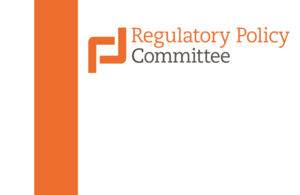Employment agencies impact assessment receives red rating from government watchdog
The Regulatory Policy Committee (RPC) has today published its opinion on the evidence base for government proposals to prohibit employment agencies from advertising exclusively overseas.

The RPC opinion is that the government’s impact assessment supporting its consultation is not fit for purpose. It is the first red rating published by the RPC since January this year, and is only the thirteenth time since 2010 that the government has proceeded with an impact assessment that the RPC has not confirmed as fit for purpose. In 2013, the RPC issued opinions on over 400 changes in law affecting business, charities or voluntary groups.
In its opinion, the RPC states that “The Department must strengthen the impact assessment in a number of areas, so that there is a robust evidence base to support the consultation. This includes: (i) setting out a clearer rationale for intervention; (ii) assessing a wider range of policy options for prohibiting overseas-only recruitment, including alternatives to legislation; and (iii) providing a fuller description of the impacts of the regulation on employment agencies, including on small and micro businesses”.
The government’s impact assessment says that overseas-only recruitment is “already potentially a breach of section 39 of the Equality Act 2010” and that there is “little evidence that many employment businesses or agencies only advertise overseas in the EU for jobs in Great Britain.”
Read the RPC opinion here and government impact assessment here.
Background
The RPC is an independent non-departmental public body, sponsored by the Department for Business, Innovation & Skills. The Committee is formed of eight independent experts from a range of backgrounds, including business, civil society and academia, supported by a secretariat of civil servants.
We assess the quality of evidence and analysis supporting many of the regulatory changes affecting businesses and civil society organisations. We check whether central government departments’ estimated costs or savings to business, as a result of regulatory reforms, are robust. We check that government departments explain why new regulation is more appropriate than the alternative, such as voluntary codes.
The RPC now helps ensure government departments consider any impacts of regulation on small businesses. Where new regulation is required, the RPC checks that the government explains how it is minimising the effects on small businesses in particular. This requires departments to provide a clear analysis of the potential impact of the proposal on smaller businesses, and the effect of proposed mitigating actions to reduce burdens.
Further information can be found through the RPC website – www.gov.uk/rpc - including published opinions on government’s regulatory proposals, the validated costs and benefits of proposals and analysis on the impact of independent scrutiny on the quality of evidence used by government departments.